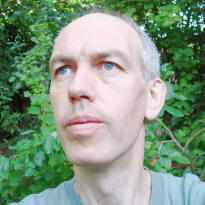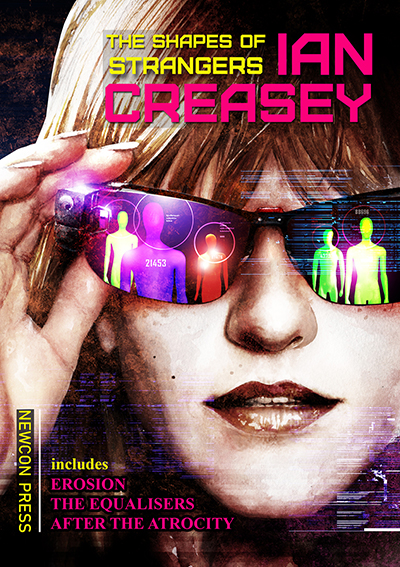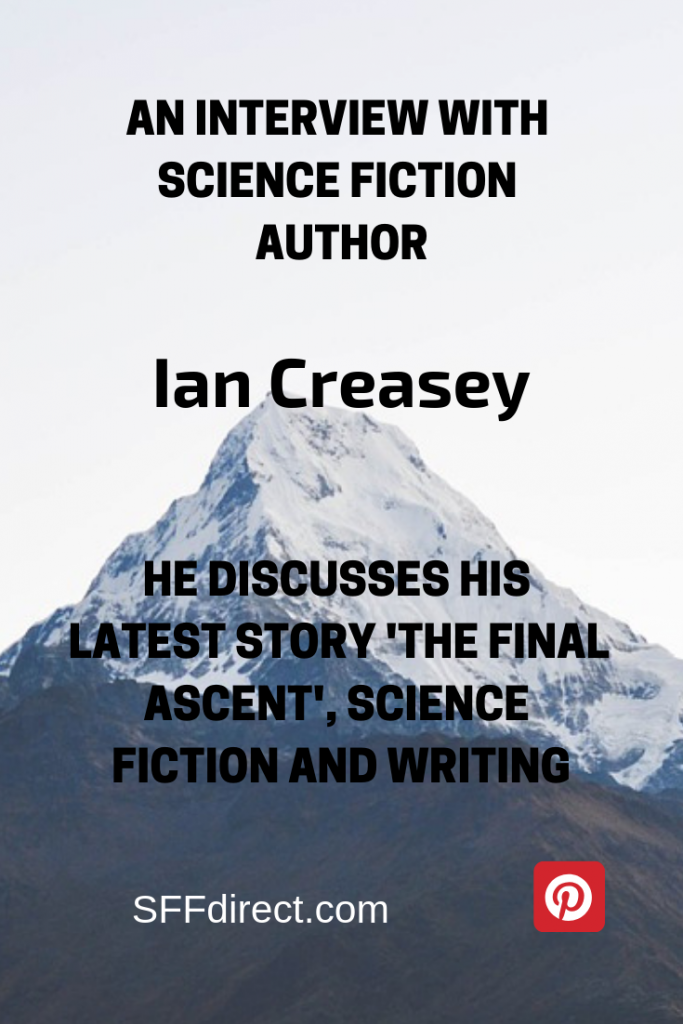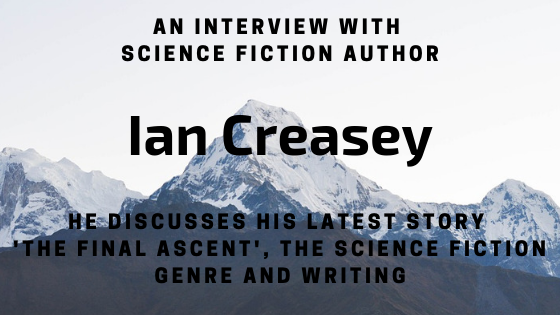
SFFdirect met Ian Creasey in Leeds on Monday 25th February to discuss all things Science Fiction, publishing and writing. The article that follows is unmissable for readers and writers of SFF. You can check out his website and bibliography at http://iancreasey.com/.
Ian Creasey is a quiet, unassuming man. This evening he is tired after a long day’s work but he still gives me his undivided attention for two hours of constant questioning, for which I am very grateful. Amazingly, this incredibly successful writer of short Science Fiction works in financial services four days a week, and still sees writing as a hobby, even after twenty years of selling stories to top SF magazines such as Analog and Asimov’s.
His most recent publication is ‘The Final Ascent‘, a novelette almost 10,000 words long appearing in the February 2019 issue of Clarkesworld. In this story, the members of an alien species, the Ardissans, are able to achieve life after death because of a particular organ in their body, the akran. The main character, Lucian, is a human man with a terminal illness. He has an akran implanted and becomes a spirit after his death.
Ian’s short story collection, ‘The Shapes of Strangers’ published by NewCon Press, comes out at Easter. In the article that follows, I’ve paraphrased Ian’s answers.
Where did you get the idea for ‘The Final Ascent’?
‘The Final Ascent’ was actually an old idea. I wrote the first draft twenty years ago. It’s been redrafted over time, and when I sent it to Clarkesworld it was accepted.
Would you want an akran implanted so you could live after death like the Ardissans?
No, definitely not. Human beings are bodily creatures; we enjoy eating, sleeping etc., and I wouldn’t want to live a disembodied existence. I see ‘The Final Ascent’ as a horror story.
Tell us about ‘The Shapes of Strangers’

I was approached by NewCon Press, who asked me to put together a collection of stories. They are stories that have appeared in SF magazines over the last few years. Of the fourteen stories, only one was in my previous self-published collections, so this book is something new for fans to purchase. It is being launched at EasterCon, where I will be present to meet readers and sign copies.
What are you working on now?
I am currently working on a novel, which will be made up of a number of related lengthier short stories. Two of the stories are already written and have appeared in magazines. I am currently writing the third, and should need another three or four. The intention is to bring them all together to form a novel.
Do you read much?
I am in two book groups, one of which is a short story group where we read collections of short fiction. Most of my reading is for these groups and it is mostly non-SF such as literary fiction, which is good because I learn a great deal from it. I’ve already read a huge amount of SF so I feel my time now is best spent reading outside the genre. I think it’s important for all writers to read widely, both inside and outside their genre. In terms of how I read, 90% of my reading is on my Kindle.
Do you believe in Writer’s Block?
I’ve never had Writer’s Block myself, but if a writer says they’re blocked I’ll take their word for it.
You’re very active on Twitter. Do you make a point of tweeting regularly?
Twitter is an ideal platform because it’s quick and easy and doesn’t take much time away from writing. It’s a great way to connect with people and find out news. For example I keep up to date with scientific discoveries through accounts from NASA, Nature, Scientific American, and the BBC’s Science account. I’m not on Facebook – I believe you need to choose where to focus your efforts.
What advice would you give a new Science Fiction writer?
1 . First and foremost, write. Don’t get distracted by other things.
2 . Community is important. Find a critique group, and get on a grapevine to keep up to date with publishing news, the fiction markets etc. Which grapevine is up to you.
3 . Do what works for you, whether you’re a planner or a pantser (writes by the seat of their pants), or whatever else. Discover your own writing process.
Which markets would you recommend a new writer of short Science Fiction targets?
My advice is to submit each story to the top magazines initially, and if the story is rejected, work your way down the list from best magazine to least. It is not always obvious which markets are top; that is why it’s important to have a community you can share information with.
It can be difficult to stick to this approach when you’re receiving rejections as you get discouraged, but you have to believe in your own work. If you keep submitting quality work to the top markets then eventually you will get noticed.
For the benefit of unpublished short story writers please explain the mechanics of selling a story to a magazine
You should always get a contract. They are usually brief affairs. It should state the period of exclusivity that the magazine will have. This is generally no more than twelve months; there is usually no good reason why they would need longer. The contract should also state the time-frame in which the magazine must publish the story. If they exceed this then you, the writer, get the rights back. Again, this should be a reasonable period of time. The contract should also state how much you will be paid.
Do you write solely what you want to write or do you adapt your style/concept to appeal to different magazines?
I always write what I want to write about and I encourage other writers to do the same. Write what you are passionate about and this will come through in the writing. It is said that each SF magazine has its own unique style but I believe the magazines are less categorisable than many believe. The top magazines all publish a range of fiction.
What is your writing process?
I write the first draft and edit it to as near perfection as possible. Then I put it away for six months to a year so I can come back to it with fresh eyes. At that point I often don’t remember the story so I edit it and revise it as an editor would. Then I get the story critiqued by friends or an online group such as Critters. After critique I’ll re-edit then I’ll put the manuscript away for another lengthy period, after which I’ll re-edit and submit to a magazine and/or put the manuscript away again, and so on.
Do you recommend any particular books on writing?
I always found practical critiquing far more helpful to me than reading books. In the early days I did a great deal of it and it was the making of me as a writer.
Do you think the Science Fiction short story market is in decline?
No, not at all. In the last twenty years there has been an improvement, and we can see that by looking at the SFWA pro rate. Twenty years ago the rate was three cents per word, but now it is six cents per word. Later this year the rate is going up to eight cents per word, which is a huge increase overall. I expect that most magazines currently paying the pro rate will adopt the new rate as they will want to stay on the SFWA list.
How do you see the future of Science Fiction literature?
I think that SF is conquering the world. It is becoming mainstream. Many literary fiction authors are publishing science fiction, for example I recently read ‘Tenth of December’, a collection of short stories by George Saunders, which won many awards. The stories were originally published in top literary fiction magazines, yet two of them are undoubtedly science fiction. It is my hope that, in this crossover, the high quality of writing in literary fiction will elevate the standard of writing across the whole science fiction genre.
Why do you write Science Fiction as opposed to another genre?
I grew up on science fiction. As a child I read a lot of Andre Norton, which I loved as it was pulpy and entertaining. My mother had SF around the house, for example ‘The Day of the Triffids’ by John Wyndham, and a tape of ‘The Hitchhiker’s Guide to the Galaxy’ radio series. The latter influenced my style as I often use comedy in my stories.
What are your views on AI and the technological singularity?
Overhyped. Yes, things will change but society will not undergo a sudden transformation into utopia.
What are your views on the Fermi paradox?
We haven’t been looking long enough to say one way or another whether other intelligent life exists in the universe. I find it hard to believe we are alone. But intelligent life may not be communicating their presence. There may be a planet full of intelligent hippie dolphins and we wouldn’t know it because they’re undetectable.
How do you feel about space exploration? Should we be more focussed about getting a person on Mars?
I think it’s a Golden Age for space exploration. We’ve recently had the New Horizons probe sending back incredible information from the Kuiper Belt; the Chinese have a probe on the moon; and we have rovers on Mars. There’s a great deal going on but it’s not headline news because it’s commonplace. I don’t think it should be a priority to get a person on Mars because it would be a purely symbolic move. For example, the moon landing was purely symbolic; no-one has been back to the moon in fifty years.
Are you optimistic or pessimistic about the future of humanity?
Optimistic, definitely. I think humanity will continue to exist and find a way to live without destroying the planet.
Tell us something about you that we’d never expect
I enjoy watching a lot of romantic comedies, for example ‘Music and Lyrics’ starring Hugh Grant and Drew Barrymore. You can learn a lot about characterisation from this type of film because the story is all about the characters. There is no falling back on special effects to wow the audience and paste over plot-holes like many SF films do these days. The audience has to believe in the characters’ relationship.
Do you have a secret talent?
I play the guitar and I do conservation work. I often channel my passion for conservation and the environment into my writing. For example, my story before ‘The Final Ascent’ was called ‘Shooting Grouse’ and was about grouse shooting on the Yorkshire moors. In fact, the first story I ever sold to Asimov’s was about an invasive alien plant that had got out into the wilds of Britain and ravaged Yorkshire. I believe this sold because my passion came through in the writing.
Describe your writing style in five words
The things I care about.
What are your future plans/goals for your writing?
To keep enjoying it.
SFFdirect would like to thank Ian Creasey very much for his time and wishes him every success with his new collection, ‘The Shapes of Strangers’.


